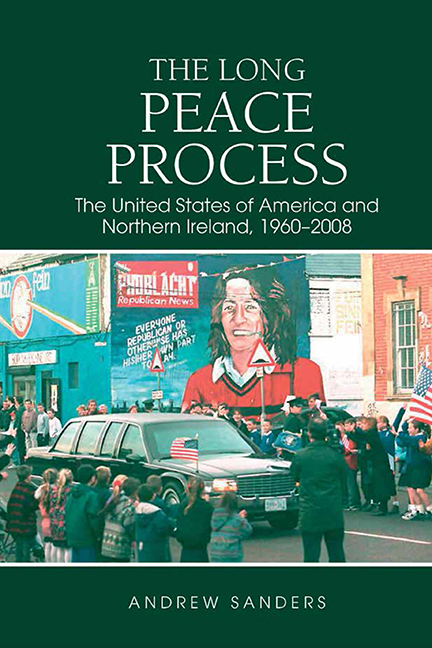Book contents
- Frontmatter
- Contents
- List of Abbreviations
- Acknowledgements
- Introduction
- 1 The USA and Ireland before 1968
- 2 The Early Years of the ‘Troubles’
- 3 Jimmy Carter and the Presidential Statement on Northern Ireland
- 4 Thatcher, Reagan, and Northern Ireland
- 5 The Bush Administration and Northern Ireland as a Local Political Issue
- 6 Bill Clinton and the Path to Good Friday
- 7 George W. Bush, Barack Obama, and Post-Conflict Northern Ireland
- Conclusion
- Select Bibliography
- Index
7 - George W. Bush, Barack Obama, and Post-Conflict Northern Ireland
- Frontmatter
- Contents
- List of Abbreviations
- Acknowledgements
- Introduction
- 1 The USA and Ireland before 1968
- 2 The Early Years of the ‘Troubles’
- 3 Jimmy Carter and the Presidential Statement on Northern Ireland
- 4 Thatcher, Reagan, and Northern Ireland
- 5 The Bush Administration and Northern Ireland as a Local Political Issue
- 6 Bill Clinton and the Path to Good Friday
- 7 George W. Bush, Barack Obama, and Post-Conflict Northern Ireland
- Conclusion
- Select Bibliography
- Index
Summary
I told him I would like to be in a position to make a deal but that any deal must be fair, and it must address to my satisfaction and my electorate's satisfaction all the fundamental issues that have blocked progress for so long … We told him that we must build a solid foundation in order to move forward … We reminded the President of the fact that he would not have terrorists in his government and that we must be satisfied that IRA terrorism is over and cannot return.
Ian Paisley on his conversation with President George W. Bush, Irish Times, 27 November 2004Bill Clinton left office as Northern Ireland began to emerge from three decades of conflict. The Good Friday Agreement, which Clinton had been heavily invested in achieving, had provided the framework for peace but its full implementation would require continued and significant investment from political actors on either side of the Atlantic.
George W. Bush, the son of the forty-first President and a former Governor of Texas, narrowly won the 2000 Presidential election. Both parties had referred to Northern Ireland in their election platforms, but it was significant that the Republican Party made more of ‘the historic reconciliation’ there. Vice-President Al Gore had sought to distance himself from Clinton during his campaign and had been marginal to Clinton's efforts in Northern Ireland in any case.
Bush's election restored a more historically familiar pattern to US– NI relations. The most significant move was the transferral of the special envoy position from the White House, where Clinton had established it, to the State Department. Bush appointed Richard Haass, a career civil servant, to the role in early 2001. The work of the envoy shifted from creating and maintaining cessations of violence and encouraging political agreement to the equally tricky task of accomplishing decommissioning. The leading scholar of the George W. Bush administration's relationship with Northern Ireland, Mary Alice Clancy, has noted that ‘the Bush administration has had a significant impact upon the politics of post-Agreement Northern Ireland, and … this is due to the autonomy that the White House grants to its special envoys to Northern Ireland’.
- Type
- Chapter
- Information
- The Long Peace ProcessThe United States of America and Northern Ireland, 1960-2008, pp. 259 - 276Publisher: Liverpool University PressPrint publication year: 2019

